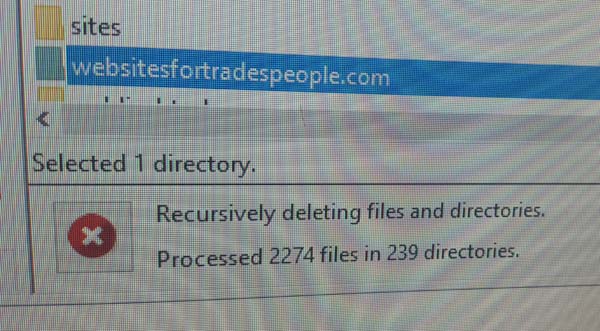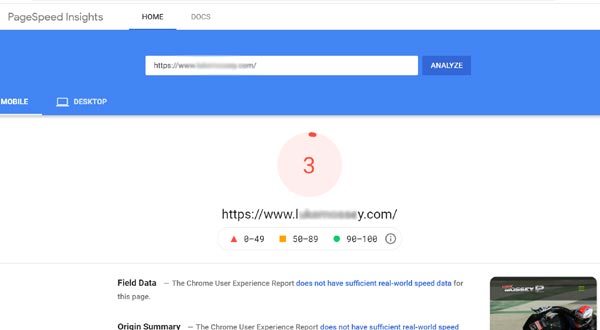Page speed, SEO and your customers
I recently attended a number of keynote SEO presentations which had been organised by Brighton SEO. Key to what I want to cover here is what was raised during a very interesting presentation by Tom Wells, speaking on behalf of Searchmetrics.
In a nutshell a vast number of websites in existence today are far slower than they ought to be. I'll go into some of the reasons for that later, but I'll start with the pros and cons of a slow website.
Advantages of a slow website
- None
Disadvantages of a slow website
- Visitors to your website may not have the patience to wait long enough for a page to load. You might think that waiting a few extra seconds for a page to display is not a big deal, but if you're expecting a potential customer to wait each page... page after page... as they try to navigate their way through your website, they're more likely to leave than buy or call.
- Elements which are needed to complete the display of the page may individually take time to load if they're large. This could lead to other parts of the page which have already downloaded to move around on the page until the display is complete.
This is known as
Cumulative layout shift
(or CLS) - On mobile phones, a slow website can be even slower due to the speed that data can be transferred over the mobile network.
- A slow website may be consuming lots of data, which may be to the disadvantage of visitors to your website using mobile phones with limited data allowances in their phone contracts.
- A slow website may be detrimental to search engine success, because Google favours faster and more stable websites than slow ones.
Let's explore some of these points and the reasons behind them, starting with Google and slow websites.
Google and slow websites
Google aims to display the most relevant search results based on the search terms that the user has entered, as well as and other factors such as their location, previous search history, etc.
Google also places a lot of emphasis on user experience. Page speed is a part of that.
If the web page which most closely satisfies the search term that a user has entered subsequently frustrates the heck out of the user when they land on that website, the end result will be a poor experience, and Google will not want to send a user to that page.
So to avoid that happening, Google will take into consideration how good or bad that website (or at least that particular page) is from a user perspective.
Core Web Vitals assessment
Google measures user experience against a concept called Core Web Vitals, which assesses user experience against a number of factors. Good or bad user experience is not based on whether the colours of one site are nicer or more vivid than the next, but based on criteria such as how long the page takes to load, and how stable the page is during the display process.
I’m sure that you have sat waiting for a page to load, and have been pleased if it loaded in less than a second, but less pleased if every page on a website took 10 seconds or more to load.
The emphasis Google places on customer experience cause many websites to perform poorly in search engine results. If the core web vitals assessment fails on a web page, it could have a great impact on that page being found in search engine results.
So what does this have to do with website builders? A huge number of websites built with website builders can be very slow. But there's more...
Web page stability
Have you ever had those frustrating times when you go to a web page, you see the link or button you want to hit, but just as you go to hit the button it suddenly moves and you hit something else by mistake? That is usually because parts of the page are still being pushed around by images, ad banners or other elements as they load.
Examples of this could be that you accidentally hit the [YES] button instead of [NO], [BUY] instead of [CANCEL], or you unintentionally hit a link that has suddenly moved and you land on the wrong page! You then have to wait for that other page to load before you return to the page you were on previously. And that’s if you can still be bothered to stay on that website at all!
Sound familiar? This is the Cumulative Layout Shift
I mentioned earlier.
What causes websites to be slow?
Obviously if you have a slow network you have a slow network. There is nothing a web designer can do to improve your network speed, but they can help the websites they build to load more quickly by not creating sites which use excessive amounts of codes, unnecessary external code files, and... here's the biggest problem... oversized images.
Building efficient websites requires experience
To write efficient code requires experience, as does knowing how to prepare images for use on different screen sizes, without those images being excessively large. By that I don't just mean how big they display, but the data size of the images files.
I go into more detail about websites with excess code and website image preparation separately, but let's acknowledge that largely due to excessive code, oversize images and poorly built websites, a huge number of websites are very slow, and typical user experience is poor.
Web page load time on mobiles
The average page load time on mobile devices is in excess of 5 seconds, and over time web pages on average have been getting heavier.
Much of this can be attributed to the rise of website building tools such as WordPress, Wix and Squarespace, combined with inexperienced web designers who have entered the profession because these website builder tools have made it fairly easy for the novice to create a simple website.
Every few hours I come across yet another ad on Twitter or Facebook to boost your business by getting online cheaply, from web designers using website builders as a means of producing quick websites. Although they're getting better, the ability for website builders to display websites with optimised images, etc., on mobile phones without the user's phone having to download excessive amounts of data is often far short of what I would consider reasonable.
And that means slow websites on mobile phones.
Building a website quickly may not result in a quick website
The trade-off for being provided the tools to build websites using platforms such as WordPress is the pre-loading of far more files, code and folders than the actual website needs.
To test this I registered a domain, downloaded WordPress onto the hosting server for that website, and created a very basic web page. I then took a look at the files on the server, and was amazed at what I found...
At a guess there must have been at least 20-30 times more code, files and folders compared to the entire Targaweb.com website. It was vast, and when I deleted those files there after building a simple test web page, there were 2274 files in 239 directories!

Website builders have their place, but it would be a mistake to think that they’re the holy grail of website production. So it’s worth being aware of a few points.
Page Speed Scores
Targa offers free website audit, and when a small business approached me and asked to me see if I could take a look at their website, I agreed.
Using Google's Page Speed Insights tool, the homepage on the website I tested scored 41/100 for mobile, and 54/100 for desktop. Compared to the websites we build at Targa which typically score between 90/100 and 100/100, that website scored poorly, but compared to many WordPress and Wix websites I have seen, it’s certainly not the worst.
Many score lower than 20/100, but only recently I came across a site designed by a professional web design agency who had built a website for a motorcycle racer. It scored an incredible 3/100 for mobile and 15/100 for desktop! You would think that professional web designers should know better!

What about website builder's own websites?
I was also curious to see how the homepages of those who produce websites builders measure up, so I visited Squarespace's own homepage.
Besides some issues across different browsers which may have subsequently been resolved, there is an abundance of animated behaviour which make sections jump out at you as you scroll up and down the Squarespace homepage. This made me curious how the page would score in Google's Page Speed Insights
tool, which rates web pages against factors such as page load time, page stability, etc,. and the list of metrics known as Core Web Vitals which I have already mentioned.
So I tried it...
The scores I saw at time of writing for the Squarespace homepage were 22/100 for mobile and 40/100 for desktop, which were significantly lower than mobile and desktop scores for targaweb.com
It also showed Core Web Vitals Assessment: Failed
for Squarespace.
Scores vary over time, but try them for yourself in real time now:
Hey, I can be a professional web designer!
Amongst the many web designers who joined the profession by taking advantage of the relative simplicity of using no code
website building tools to produce websites quickly and cheaply, there is clearly a lack of care and understanding, and their customers are largely unaware that the reasons their websites are slow is largely because of the way they have been built.
I have seen a great many websites where Google’s PageSpeed Insights returned unreasonably low scores, and considering that many of these sites have been built by web design agencies who also offer SEO services, I have to question why they’re as bad as they are.
One reason is cost and the ongoing trend to drive costs downwards by endlessly undercutting the competition, and that inevitably means that corners will be cut. Websites built using site builders can be cheap because they’re quick and easy to build due to template selection, colour pickers, and the drag and drop nature of putting a page together.
But they don't have to be slow...
If the web designer has some understanding of code (HTML, CSS, PHP, JavaScript, SQL queries, etc), cares enough about performance and user experience, and isn't solely motivated by being producing cheap websites, websites build using website builder tools can actually be very good.
I hope this insight has been useful, so good luck!
Thoughts, suggestions or comments?
Comments or Feedback?
If you have any comments, thoughts or suggestions about this article, please let us know.
Use the social media buttons below to share this article.

This article was written by Daron Harvey, founder of TargaWeb. Daron is now in his 29th year of professional website design, development, testing and management, including 21 years on the development and management of Hertz multilingual global e-commerce platform.







